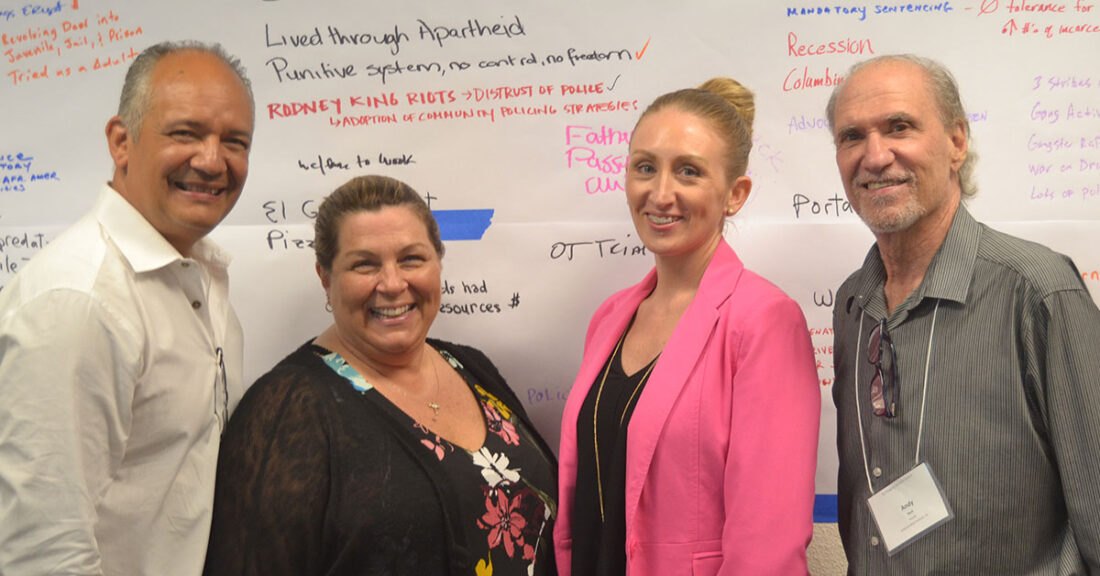Pima County Reforming Juvenile Justice With Casey-Sponsored Training

From left: William Rodriguez with Wheelock College, Sheila Kembel with the Pima County Juvenile Court Center, Angie Lopez with the Arizona Supreme Court and Andy Beck with School & Main Institute
Juvenile justice stakeholders in Pima County, Arizona, home to Tucson, have completed the Re-Imagining Juvenile Justice training, and participants are now rethinking the way they approach their work.
Dale Cardy, supervisor of the juvenile unit at the county attorney’s office, was particularly moved by the perspectives shared by youth and families during the three-month training. “It was a reminder,” he says, “that everybody comes to the table with their own story. They have their explanations for why they came to the system.”
The training, supported by the Casey Foundation, engaged emerging leaders from a variety of agencies that work with youth in the justice system to strengthen their understanding and application of principles of positive youth development — a comprehensive framework outlining all the sources of support young people need to be successful.
The curriculum is comprised of six modules, delivered over three months:
- Positive youth development
- Utilizing a cross-systems approach
- Addressing racial and ethnic disparities
- Infusing youth voice in juvenile justice work
- Fostering positive family relationships
- Transforming policy and practice
Developed by Wheelock College’s Department of Juvenile Justice and Youth Advocacy (now the Wheelock College of Education and Human Development at Boston University) and the School & Main Institute, Re-Imagining Juvenile Justice launched its first pilot site in Massachusetts in 2016. Because of Pima County’s established record of reform and broad commitment to youth-centered collaboration, it was selected as the second pilot site after a competitive application process open to all JDAI sites. Eighteen sites applied.
The professional development series encourages participants to shift their mindsets by thinking outside of their traditional roles to develop youth- and family-centered reforms. “One of the biggest barriers to reform is a lack of staff support for the reform effort,” says David E. Brown, senior associate in the Foundation’s Juvenile Justice Strategy Group. “Even if leaders at the top decide to do things differently, reforms won’t go far without staff input and buy in.” Re-Imagining Juvenile Justice is designed to include frontline staff in reform planning and share the latest knowledge with them about ways to productively engage young people.
An array of representatives from Pima County participated in the training: probation, detention, police, county attorney, public defender, juvenile court, behavioral health, schools, community-based providers and the juvenile justice system’s youth advisory council. Curriculum developers and instructors Andy Beck and William Rodriguez agree that the variety of participants allowed people to challenge assumptions and share valuable information. “The power of doing this together supersedes anything one agency could do alone,” Beck says.
The training is already influencing changes in practice. For example, a comprehensive list of resources compiled by participants as part of a training exercise will be shared throughout the county.
“Success depends on whether people will work together,” says Rodriguez. “Stitch a piece of a quilt, a square, representing your agency. You need a main stitcher to then stitch everything together, put a panel around that quilt. Take that quilt at the end of the day and wrap it around the youth.”






